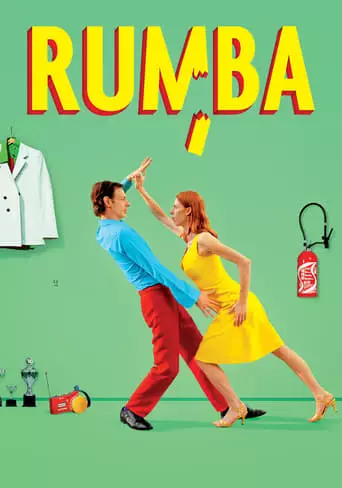Teachers in a rural school, happy couple Fiona and Dom have a common passion: Latin Dancing. One night, after a glorious dance competition, they have a car accident and see their lives turn upside down. Rumba or how optimism and humour can overcome fatality!
Rumba (2008), directed by Dominique Abel and Fiona Gordon, is a whimsical French comedy that blends slapstick humor with heartfelt moments. The story follows Dom and Fiona, a married couple who are passionate about Latin dance, particularly the rumba. Both are school teachers and renowned dancers, having amassed a collection of trophies. However, their life takes a tragic turn when they are involved in a car accident caused by a man attempting suicide. The accident results in Dom suffering from severe memory loss, while Fiona loses her leg, which she replaces with a wooden prosthetic.
The film then follows the couple as they struggle to adapt to their new reality. Despite their disabilities, they continue to dance in their unique and charming way, which provides a counterpoint to their adversity. Their journey is punctuated by surreal and absurd sequences that mix physical comedy and dream-like moments.
Themes and Analysis
Rumba is a tale of resilience, love, and adaptation. The film explores how the human spirit can overcome immense personal challenges, but it does so with a surreal, comedic approach that distances it from more conventional “triumph-over-adversity” stories. Rather than focusing on the emotional weight of the couple’s disabilities, the film turns these challenges into the basis for absurd, slapstick humor. The film’s themes include:
- Love and Partnership: Dom and Fiona’s love for each other remains intact even after their lives are drastically changed. Their connection is strengthened by their shared passion for dancing, and they continue to find joy in their relationship despite their physical limitations.
- The Resilience of the Human Spirit: Despite the serious injuries they sustain, both characters continue to pursue their passion for dancing. The film portrays the idea that, even when confronted with seemingly insurmountable obstacles, people can adapt and find new ways of living.
- Surreal Humor and Absurdity: Drawing inspiration from directors like Jacques Tati, Rumba uses physical comedy and surreal elements to depict the couple’s journey. It emphasizes the absurdity of life’s challenges and the comic potential of everyday situations.
10 Reasons to Watch Rumba (2008)
- Unique Blend of Comedy and Drama: The film combines slapstick humor with emotional depth, making for a refreshing take on the dance and disability genres.
- Charming Performances: Dominique Abel and Fiona Gordon, who also co-direct the film, deliver endearing and heartfelt performances, drawing the audience into their quirky world.
- Surreal Humor: If you appreciate films that embrace the absurd, Rumba delivers a series of surreal moments that make the humor feel fresh and unique.
- Physical Comedy: The film is a tribute to classic silent films and physical theater, with many scenes relying on visual gags and slapstick that harkens back to early cinematic styles.
- Inspiring Story of Resilience: Rather than focusing on the tragedy of disability, the film highlights the couple’s ability to find joy and meaning through their love and shared passion for dance.
- Dream Sequences: The dreamlike scenes, such as the couple dancing over the ocean and the shadow-dance in wheelchairs, are visually stunning and emotionally moving.
- French Surrealism: If you’re a fan of French cinema and its tradition of surrealism, Rumba offers a modern spin on the genre with its quirky, whimsical style.
- Creative Cinematic Techniques: The film’s semi-silent, physical storytelling style is a refreshing break from dialogue-heavy films and adds a layer of charm and intimacy.
- Short and Sweet Runtime: With a runtime of only 77 minutes, the film offers a compact but delightful viewing experience that doesn’t overstay its welcome.
- A Break from Hollywood Formula: If you’re tired of predictable plots and formulaic Hollywood films, Rumba provides a welcome antidote with its innovative storytelling and unconventional approach.
What Will You Feel After Watching Rumba?
After watching Rumba, you might experience a mix of emotions, from laughter to a deeper appreciation for life’s little absurdities. The film’s light-hearted, whimsical tone leaves you with a smile, yet its underlying themes of love and resilience may also evoke a sense of warmth. You’ll likely feel uplifted by the couple’s determination to continue dancing despite their challenges, while also appreciating the surreal humor that makes the film so distinctive.
Ultimately, Rumba is a celebration of human perseverance, love, and the joy of finding beauty in unexpected places. You may leave the film feeling inspired to face your own challenges with a lighter heart, and perhaps a little more inclined to embrace the quirky, unpredictable nature of life.
The film is a reminder that sometimes, even in the face of adversity, there is room for laughter, love, and dance.

